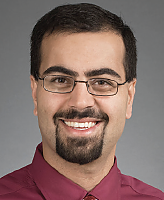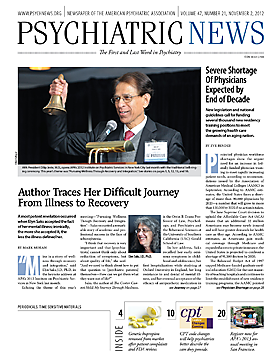I’ve previously written about my passion for advocacy, particularly in health-system and education reform. My involvement with APA, though, has been equally driven by my “day job” as a physician-scientist.
I spend two days a week in the lab developing animal models for emerging neuromodulation treatments, and I hope to focus my clinical practice around those therapies. Because this is such a new and rapidly evolving field, I have needed a fair amount of mentorship and networking to begin establishing my career, and APA has provided help on several levels. In this column, I’ve summarized some of the resources that helped me, in the hope that it will assist you as you plan your own careers.
Much of APA’s assistance to clinician-scholars comes during our annual meeting each May. It starts with the poster sessions—there are several specifically for residents, and well-executed work has little difficulty being accepted for the main sessions. There is also the Research Colloquium for Junior Investigators, an intensive daylong mentoring experience in which some of the leading figures in psychiatry provide feedback on both your science and your career path. Application is very competitive, but well worth it if you’re committed to an academic career path.
Even if you aren’t able to participate in the colloquium, you can still attend the Early-Career Mentoring Breakfast sponsored by APA’s Office of Research, which is less intense but still a wonderful networking opportunity.
If your science is already taking off, you could submit it for the APA/Lilly Resident Research Award (for research on any topic) or the Kempf Fund Award for Research Development in Psychobiological Psychiatry and win both fame and extra travel funds.
Outside of the annual meeting, APA sponsors the yearlong Pfizer and Lilly fellowships, both for experienced M.D./Ph.D.s and those who are tasting the thrill of discovery for the first time. Those fellowships are available only for your first postresidency year, meaning that you’ll need to plan ahead and apply early during PGY-4 (or PGY-5 if you’ve done some advanced clinical training).
If you are just starting out and trying to build a publication record, our American Journal of Psychiatry publishes a monthly Residents’ Journal online supplement, an excellent exposure to the authorship and peer-review process that’s more supportive than what one is likely to receive through a typical journal.
Beyond those concrete resources, there’s a bigger picture. One of the greatest challenges facing junior psychiatric investigators is funding. With dwindling state and federal budgets, there is simply not enough money to support all the good ideas that could move our profession forward. APA is constantly lobbying for greater training and resources, most recently through former Rep. Patrick Kennedy’s One Mind for Research initiative (Psychiatric News, May 18).
I have personally been involved in an APA-NIMH collaboration that seeks to build greater research literacy within individual residencies, and you may have received one of our surveys by the time you see this column. Furthermore, my roster of APA Board of Trustees colleagues, especially the ranks of our recent presidents, reads like a “Who’s Who” of modern psychiatric neuroscience. People like Alan Schatzberg, a past president, and Jeffrey Lieberman, the president-elect, aren’t there by chance—they are part of APA because they recognize the role our organization plays in advancing the science that underpins our field, and because we need their experience to keep our advocacy effective. (They are also there to mentor people like you and me, another reason to consider getting involved as a resident leader in APA!)
In short, promoting psychiatric research is part of APA’s mission statement, and members fulfill that mission at every level, from aiding and mentoring young investigators, to advocating for the resources psychiatrists will need throughout their careers. That commitment to supporting and disseminating science is what will keep me involved with APA in years to come, and I hope it will offer you some value as well.
If you are interested in one of the programs I’ve cited, most of them can be accessed at
www.psychiatry.org/residents/fellowships-awards and the rest can be found through your favorite search engine. Or if you prefer, feel free to contact me and ask about these or any other opportunities—I am always trying to develop my own skills as a mentor and am happy to help!

Alik Widge, M.D., Ph.D., is APA’s member-in-training trustee and a PGY-4 resident at the University of Washington.

